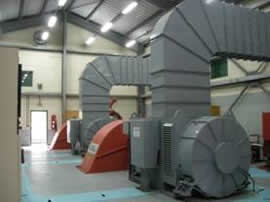Water and Wastewater Services Management
Syllabus
PLEASE NOTE THAT MATRICULATION TO THIS PROGRAMME IS NOT POSSIBLE AS 2016-2017 WILL BE ITS FINAL YEAR OF OFFERING.
CIEN 6000 - Advanced Environmental
Engineering
- Theory of water and wastewater treatment.
- Design of drinking water and wastewater treatment systems.
- Advanced water and wastewater treatment systems (for example, chemical precipitation, aeration, ion exchange, membrane processes).
- Biological nutrient removal systems.
- Industrial ecology.
- Waste minimization technologies.
- Pollution prevention.
- End-of-pipe treatment.
- Gaseous pollutants and dispersion models.
- Life cycle assessment.
CIEN 6009 - EIA of Water Resources Projects
- Objectives of EIA.
- Legal context.
- Scope of impacts of water resource projects, visual, audible, smell, water quality, contaminants in water and on sediments, pollution ecology, quality standards.
- The impact of water resource management on urban and rural communities.
- Watershed impacts.
- Mitigation and remedial measures, control measures, consequences of infringement, monitoring and management.
CIEN 6010 - Advanced Engineering Hydrology
- Hydrologic processes.
- Climate change issues.
- Hydrologic data.
- Design of hydrometeorological networks.
- Probability and statistics for hydrology.
- Modelling approaches.
- Stochastic modelling.
- Deterministic modelling.
- Model applications.
CIEN 6011 - Water Resources Metrics
- Descriptive statistics.
- Measurements and monitoring techniques for hydrometeorological surveys.
- Sediment and water quality sampling techniques.
- Emerging technologies and best practice.
- Satabase development.
- Spatial techniques.
COEM 6018 - Independent Research Project
The material covered will be a reflection of the student’s own requirements/interest. In general, all projects will demand:
- Problem identification and definition of objectives.
- Planning and execution within time and cost constraints.
- Information search and its interpretation.
- Evaluation resulting in the making of conclusions.
COEM 6006 - Construction Accounting And Finance
- Introduction to accounting.
- The nature and purpose of financial accounting, business entity, different forms of business organisations.
- Business law and the company act, chart of accounts, recording accounting transactions, the accounting cycle, profit and loss statement, balance sheet, accounting ratios, accounting controls.
- Introduction to Management Accounting.
- Cost classification, methods of costing, job costing and contract costing, integrated accounts.
- Introduction to Financial Management: project financing, budgeting, financial planning and cost control.
COEM 6009 - Contract Management And Construction Law
- The elements of the Law of Tort.
- The impact of law on the delivery of goods and services.
- Types of contracts.
- Different procurement systems.
- Standard form of contracts (specifications codes of practice; standards, statutes and local government regulations).
- Identification of skills required, manpower planning and development, education, training, recruitment, certification, Industrial climate, politics, trade unionism, disputes and conflict resolution methods.
- Professional codes of ethics, professional liability.
- Claims.
- The risk assessment of time, cost, quality, health & safety, sustainability and environmental issues.
- Introduction to international law.
COEM 6020 - Research Methods
The topics covered in the unit will include:
- Principles of research.
- Information sources.
- Research design.
- Research methodology.
- Data collection.
- Data analysis.
- Presenting research proposals.
- Writing research reports.
COEM 6025 - Practical Team Project
The projects are based upon real schemes and involve:
- Information gathering.
- Planning.
- Organisation.
- Co-ordination.
- Detailed assessment of ideas.
- Reporting.
- Presentation.
















